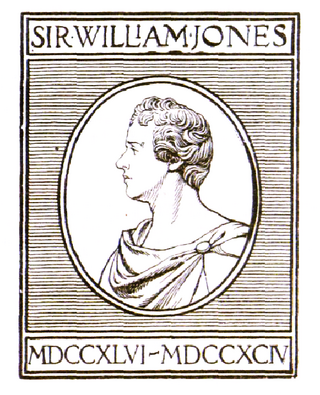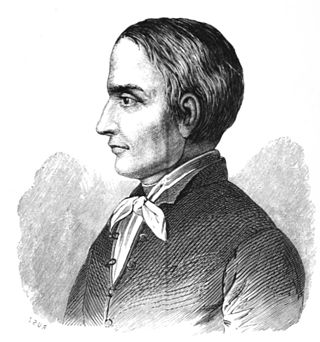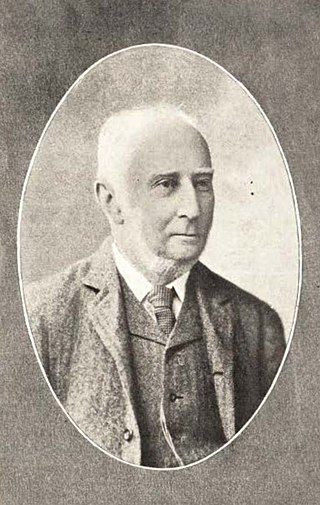
Henry Thomas Colebrooke FRS FRSE FLS was an English orientalist and mathematician. He has been described as "the first great Sanskrit scholar in Europe".

Sir Charles Wilkins was an English typographer and Orientalist, and founding member of The Asiatic Society. He is notable as the first translator of Bhagavad Gita into English, He supervised Panchanan Karmakar to create one of the first Bengali typeface. In 1788, Wilkins was elected a member of the Royal Society.

The Royal Asiatic Society of Great Britain and Ireland, commonly known as the Royal Asiatic Society, was established, according to its royal charter of 11 August 1824, to further "the investigation of subjects connected with and for the encouragement of science, literature and the arts in relation to Asia." From its incorporation the society has been a forum, through lectures, its journal, and other publications, for scholarship relating to Asian culture and society of the highest level. It is the United Kingdom's senior learned society in the field of Asian studies. Fellows of the society are elected regularly and include highly accomplished and notable scholars of Asian studies; they use the post-nominal letters FRAS.

Horace Hayman Wilson was an English orientalist who was elected the first Boden Professor of Sanskrit at Oxford University.

The Asiatic Society is a government of India organisation founded during the Company rule in India to enhance and further the cause of "Oriental research", in this case, research into India and the surrounding regions. It was founded by the philologist William Jones on 15 January 1784 in a meeting presided over by Justice Robert Chambers in Calcutta, the then-capital of the Presidency of Fort William.

Aloys Sprenger was an Austrian Oritentalist.
Indology, also known as South Asian studies, is the academic study of the history and cultures, languages, and literature of the Indian subcontinent, and as such is a subset of Asian studies.
Wladimir Alekseevich Ivanow was a Russian orientalist. He was born in Saint Petersburg, Russia and died in Tehran, Iran. He was a scholar of Islam, with a particular focus on Ismailism. He graduated in 1907 and joined the faculty of Oriental Languages of the University of St. Petersburg.

Sándor Csoma de Kőrös was a Hungarian philologist and Orientalist, author of the first Tibetan–English dictionary and grammar book. He was called Phyi-glin-gi-grwa-pa in Tibetan, meaning "the foreign pupil", and was declared a bosatsu or bodhisattva by the Japanese in 1933. He was born in Kőrös, Grand Principality of Transylvania. His birth date is often given as 4 April, although this is actually his baptism day and the year of his birth is debated by some authors who put it at 1787 or 1788 rather than 1784. The Magyar ethnic group, the Székelys, to which he belonged believed that they were derived from a branch of Attila's Huns who had settled in Transylvania in the fifth century. Hoping to study the claim and to find the place of origin of the Székelys and the Magyars by studying language kinship, he set off to Asia in 1820 and spent his lifetime studying the Tibetan language and Buddhist philosophy. Csoma de Kőrös is considered as the founder of Tibetology. He was said to have been able to read in seventeen languages. He died in Darjeeling while attempting to make a trip to Lhasa in 1842 and a memorial was erected in his honour by the Asiatic Society of Bengal.

Sir George Abraham Grierson was an Irish administrator and linguist in British India. He worked in the Indian Civil Service but an interest in philology and linguistics led him to pursue studies in the languages and folklore of India during his postings in Bengal and Bihar. He published numerous studies in the journals of learned societies and wrote several books during his administrative career but proposed a formal linguistic survey at the Oriental Congress in 1886 at Vienna. The Congress recommended the idea to the British Government and he was appointed superintendent of the newly created Linguistic Survey of India in 1898. He continued the work until 1928, surveying people across the British Indian territory, documenting spoken languages, recording voices, written forms and was responsible in documenting information on 179 languages, defined by him through a test of mutual unintelligibility, and 544 dialects which he placed in five language families. He published the findings of the Linguistic Survey in a series that consisted of 19 volumes.
Fort William College was an academy of oriental studies and a centre of learning, founded on 18 August 1800 by Lord Wellesley, then Governor-General of British India, located within the Fort William complex in Calcutta. Wellesley started the Fort William College to train the European Administrators. He backdated the statute of foundation to 4 May 1800, to commemorate the first anniversary of his victory over Tipu Sultan at Seringapatam. Thousands of books were translated from Sanskrit, Arabic, Persian, Bengali, Hindi, and Urdu into English at this institution.

The Ain-i-Akbari or the "Administration of Akbar", is a 16th-century detailed document recording the administration of the Mughal Empire under Emperor Akbar, written by his court historian, Abu'l Fazl in the Persian language. It forms Volume III and the final part of the much larger document, the Akbarnama, also by Abu'l-Fazl, and is itself in three volumes.
Sir Gaṅgānāth Jhā was a scholar of Sanskrit, Indian philosophy and Buddhist philosophy.

Muhammad Saleh Kamboh Lahori was a noted Mughal calligraphist and official biographer of Emperor Shah Jahan and the teacher of Mughal Emperor Aurangzeb. Though a widely read person, little is known of the life of Muhammad Saleh Kamboh other than the works he composed. He was son of Mir Abdu-lla, Mushkin Kalam, whose title shows him to also have been a fine writer. He is believed to be younger brother of Inayat-Allah Kamboh and worked as a Shahi Dewan (Minister) with the governor of Lahore. He held the title of Sipahsalar.

Raja Rajendralal Mitra was among the first Indian cultural researchers and historians writing in English. A polymath and the first Indian president of the Asiatic Society of Bengal, he was a pioneering figure in the Bengali Renaissance. Mitra belonged to a respected family of Bengal writers. After studying by himself, he was hired in 1846 as a librarian in the Asiatic Society of Bengal, for which he then worked throughout his life as second secretary, vice president, and finally the first native president in 1885. Mitra published a number of Sanskrit and English texts in the Bibliotheca Indica series, as well as major scholarly works including The antiquities of Orissa, Bodh Gaya (1878), Indo-Aryans and more.

George Nicolas de Roerich was a prominent 20th century Tibetologist. His name at birth was YuriNikolaevich Rerikh. George's work encompassed many areas of Tibetan studies, but in particular he is known for his contributions to Tibetan dialectology, his monumental translation of the Blue Annals, and his 11-volume Tibetan-Russian-English dictionary.
The Calcutta School-Book Society was an organisation based in Kolkata during the British Raj. It was established in 1817, with the aim of publishing text books and supplying them to schools and madrasas in India.

Charles Henry Tawney (1837–1922) was an English educator and scholar, primarily known for his translations of Sanskrit classics into English. He was fluent in German, Latin, and Greek; and in India also acquired Sanskrit, Hindi, Urdu, and Persian.
Nalinaksha Dutt (1893–1973), was an Indian scholar of Buddhism, professor of Sanskrit and Pali at the University of Calcutta and chaired The Asiatic Society, among other representative functions, as Vice-President of the Maha Bodhi Society.
Maulawi Āghā Aḥmad ʿAlī was a 19th-century Bengali academic, historian and scholar of the Persian language. In addition to Persian, he also composed poetry in Urdu. He is seen as one of the greatest Persian scholars of Dhaka, and even Bengal as a whole.












